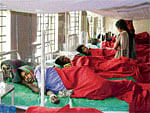
Funded and developed by the Department of Biotechnology, Ministry of Science and Technology, the phase II trial will be conducted on 60 volunteers at the National Institute of Cholera and Enteric Diseases (NICED), Kolkata.
According to NICED director Dr G B Nair, it is the first attempt nationally to create a live oral vaccine.
“Cholera should be taken very seriously. The World Health Organisation (WHO) bulletin states that there is lot of cholera in our country but it's not talked about, since it is associated with the poor. Even the advocacy about the disease has been poor,” he said.
Better advantage
Live vaccine is better than killed vaccine, which is licensed and commercially available in India for the last two years, as the efficacy is more. Also, in comparison to the killed oral vaccine that requires two doses, IOCV is a one dose vaccine that will ensure fewer dropout rate during the scheduled vaccination camps. As for the cost, the DBT official said that post phase III trials, which will take place later this year, IOCV will be cost effective and the cost will be competitive with the current killed oral vaccine.
While killed oral vaccine for cholera is licensed and available in the country for the last two years, it is not used in the public sector healthcare system. There is no policy on cholera right now in the country like TB, polio, etc. Most cases of cholera in people from abroad, who visit India, are not reported since that would affect the tourism industry, revealed the official.
Hence, DBT along with NICED and other stakeholders are working on formulating a national policy.
“Once IOCV is fully developed, it will help generate surveillance information like where the endemic areas are, locating where outbreaks occur, etc,” said Dr Nair.
Karnataka scenario
Although cholera cases have considerably come down in the last 15 years, certain districts still report cases during summer.
For instance, Chitradurga, Dharwad and Hassan districts saw three deaths in April.
Davangere and Kodagu have reported cases from January till March. Meanwhile, 30 cholera positive cases have been reported in the state till April, this year.
“Though we cannot point out endemic areas, where sanitation is bad and whenever water gets contaminated, cholera cases spread. However, situation has improved in the last 15 years,” said Dr T S Cheluvaraj, joint director (CMD), health department.
The killed cholera vaccine is not used by the health department since it is not included in the national immunisation programme. Meanwhile, 341 cholera cases and six deaths (the highest in the last five years) were reported in 2010.